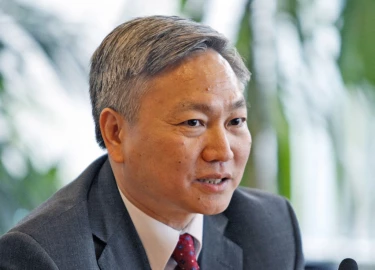- World Bank director says Kenya faces a structural challenge where a disproportionate share of public funds is tied up in recurrent costs rather than development projects.
 Qimiao Fan, World Bank Country Director for Kenya. (Photo by AFP)
Qimiao Fan, World Bank Country Director for Kenya. (Photo by AFP)Kenya must take bolder steps to overhaul its public spending structure and improve financial discipline if it hopes to create more room for investment in critical development projects, the World Bank has advised.
The multilateral lender’s country director for Kenya, Qimiao Fan, in a Tuesday interview with NTV, acknowledged Kenya’s recent progress in reducing its debt-to-GDP ratio from over 70% to around 67% at the close of last year.
But he cautioned that this alone is not enough to secure long-term fiscal sustainability or accelerate growth.
“Kenya has been able to reduce its debt-to-GDP ratio… that is a good direction. However, we believe the current reduction needs to be more for it to be sustainable,” said Fan.
According to the country director, Kenya faces a structural challenge where a disproportionate share of public funds is tied up in recurrent costs rather than development projects.
“Over 86 percent of Kenya’s public expenditure is on wages, pensions, and interest payments; that means there is very little left to build roads, invest in schools, and create more healthcare facilities,” he noted.
“There is nothing intrinsically wrong with debt; the question is how you use it: if it is productive use that can help you increase your growth and create jobs, giving you more capacity to borrow.”
The World Bank has previously warned that Kenya’s debt level is increasingly concerning, classifying it as a "high risk of default" to put more pressure on the National Treasury.
The lender says President William Ruto’s government’s ‘austerity measures’ alone might not be enough to get the country out of fiscal hurdles, saying structural and governance reforms are also needed. Treasury should ensure Kenya does not default to avoid far-reaching consequences to the economy, it warns.
World Bank’s public finance review for Kenya, released in May, recommends sweeping reforms to save money and tame the burgeoning national wage bill.
Among them is a two-year public service hiring freeze, slashing of the government’s travel-related budget, and the exemption of low-income earners from the housing levy, which it says raises the relative cost of labour, thus reducing formal employment.
“There is significant room for improving efficiency and equity of public expenditure,” Fan said in the Tuesday interview.
“Undertake the much-needed structural reforms, including addressing governance issues and making the investment climate much more conducive to attract private investment. That creates a fast-growing economy with more jobs.”
The World Bank has also proposed the introduction of a carbon tax and higher excise taxes on alcohol, tobacco, and sugar-sweetened beverages, which it terms a considerable and growing contributor to mortality and morbidity.
Kenya's domestic and external debt is projected to reach Ksh.12 trillion by the end of the 2025/26 financial year.
Debt service obligations are also estimated to exceed Ksh.1 trillion in the current fiscal year – a quarter of the Ksh.4.2 trillion budget presented last month.
©Citizen Digital, Kenya
 6 days ago
165
6 days ago
165


